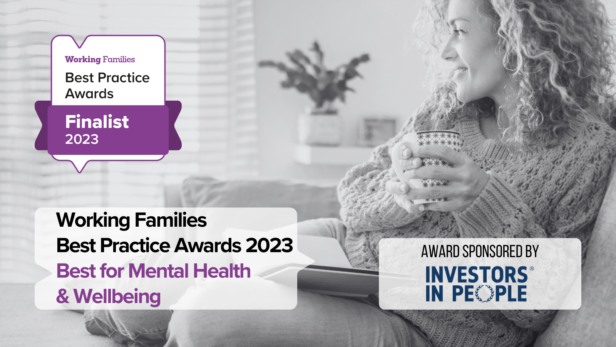dentsu – Finalist 2023, Best for mental health and wellbeing, sponsored by Investors in People
dentsu’s continued investment and prioritisation of mental health support at all levels, alongside their commitment to listening and responding to employee needs, secures their place as a leader in the field.
The right tools
dentsu uses a wellbeing dashboard to inform senior executives of wellbeing successes and challenges, including retention, workload and absence by tracking uptake of holiday and wellness days, sickness absence and wellbeing check-in scores. There are no targets in place, but metrics are monitored to pick up trends and be responsive in order to prevent burnout. A wellbeing toolkit has been developed for leaders to have honest conversations with their teams about workload, capacity, and wellbeing. There has been investment in platforms and partnerships, such as Business in the Community who consult on questions relating to wellbeing, and Talking Talent for supporting parents and carers through access to a virtual coach.
Listening to staff
Employee engagement surveys are used to assess any initiatives’ impact on mental health and wellbeing and a global employee survey, as well as onboarding and leavers surveys, provide touch points and insights into where action or development is needed. Based on insights from the global employee survey there is a focus on holistic wellbeing with a programme of expert-led workshops that focuses on the foundations of wellbeing to help employees integrate healthy habits.
Supportive practices
There is a clear commitment to flexible recruitment demonstrated by making it the default for all vacant roles. A fluid hybrid working model empowers employees to decide how, when, and where they work to deliver results. A culture of trust has been implemented, providing tools and guidance for hybrid working and encouraging teams to develop their rhythm. Globally, offices close on or around World Mental Health Day. One of the three dedicated wellness days is allocated to that day and employees are encouraged to take the day their way to focus on their mental health.
Challenging stigma
Genuine effort to reduce stigma around mental health in the workplace is demonstrated through a content series that includes blogs, thought leadership and advocacy from leaders. There has been an expansion of Mental Health First Aiders to a ratio of 1:50 in line with HSE recommendations for physical first aiders. Creative branding is used to give them a unique positioning as ‘Kind Minds’ – using mugs and merchandise across the office to familiarise and normalise the conversation about mental health in the business. Wellbeing is explored from an intersectional perspective, with workstreams looking at the overlap between wellness and LGBTQ+ issues, race and ethnicity, working parents, disability, neurodiversity and social mobility.
